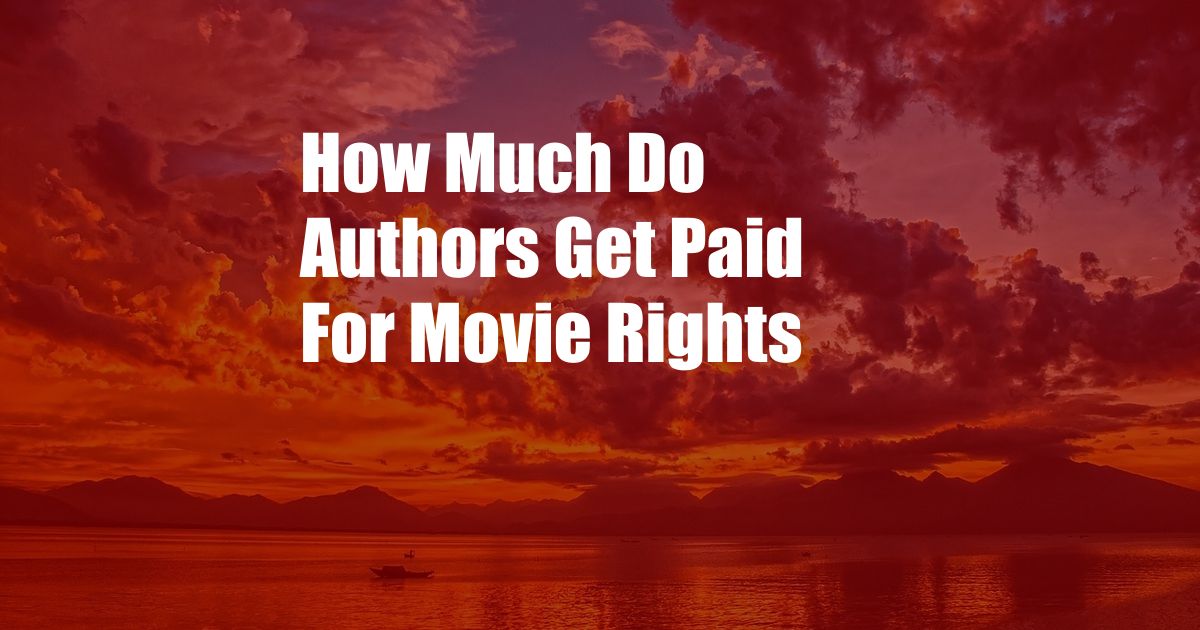
How Much Do Authors Get Paid for Movie Rights?
When a beloved book is brought to the big screen, the author’s name becomes synonymous with the cinematic masterpiece. But how much of that box office success translates into cold, hard cash for the writer? Embark on a journey into the intricate world of movie rights, where we will uncover the financial rewards that await literary geniuses when their creations make the leap from page to screen.
Understanding Movie Rights
Movie rights refer to the legal authorization granted by the copyright holder (typically the author) to a production company to adapt their work into a film or television series. This grant includes the right to produce, distribute, and profit from the adapted work. In exchange, the author receives compensation, known as a movie option or sale agreement.
The Financial Landscape: Options and Sale Agreements
When an author sells the movie rights to their book, they can choose between two primary options:
-
Option Agreement: The production company acquires the exclusive right to adapt the book within a specified time frame (usually 1-3 years). If the movie is not made during that time, the rights revert to the author. In exchange, the author receives an option fee, typically ranging from $5,000 to $50,000.
-
Sale Agreement: The production company permanently acquires the movie rights. In this case, the author receives a lump sum payment, which can vary significantly depending on factors such as the book’s popularity, the author’s reputation, and the potential box office draw. Sums can range from tens of thousands of dollars to millions.
The Nuanced Art of Negotiation
Negotiating a movie rights deal is a delicate dance, with factors such as:
- The Author’s Bargaining Power: Bestselling authors with a proven track record have greater leverage in negotiations.
- Anticipated Box Office Success: Projected ticket sales strongly influence how much an author can command.
- Producer Involvement: The reputation and financial success of the production company plays a significant role.
- Royalties: In some cases, authors may also negotiate a percentage of the film’s profits, known as royalties.
Recent Trends and Developments
The film industry is constantly evolving, affecting the landscape of movie rights. Notable trends include:
- The Rise of Streaming Platforms: Streaming services have sparked competition for movie rights, driving up prices for popular titles.
- Expanding Global Markets: As international audiences grow, authors are increasingly benefiting from the sale of rights to foreign territories.
- Crowdfunding and Self-Publishing: Authors are exploring alternative routes to screen adaptations, reducing reliance on traditional publishing and film studios.
Tips and Expert Advice for Authors
Navigating the world of movie rights can be daunting. Here’s some expert advice to help you maximize your earnings:
- Protect Your Rights: Consult an attorney before signing any agreements to ensure your interests are protected.
- Research the Market: Determine the value of your book by studying comparable rights deals.
- Negotiate for Backend Earnings: Push for royalties to participate in the film’s potential profits.
- Build Your Brand: Establish a strong author platform and online presence to increase your value as a literary property.
Frequently Asked Questions
Q: What happens if my book is optioned but not made into a movie?
A: If the option expires without the film being produced, the rights revert to you. You can then shop the rights to other production companies.
Q: Is it possible to negotiate a writing credit in my movie rights deal?
A: Yes, but writing credits are typically reserved for screenwriters who significantly contribute to the screenplay adaptation.
Q: How long do movie rights typically last?
A: Option periods usually last 1-3 years. Sale agreements are typically permanent.
Conclusion
The journey of turning a beloved book into a cinematic masterpiece involves a complex tapestry of legal, financial, and creative considerations. Understanding the intricacies of movie rights empowers authors to negotiate fair compensation for their literary creations. Embrace the excitement and opportunity that this transformative medium presents, and may your stories continue to captivate audiences on both the page and the screen.
Are you curious about the latest developments in movie rights and how they impact authors? Share your thoughts in the comments below.